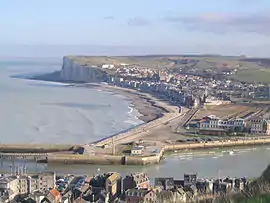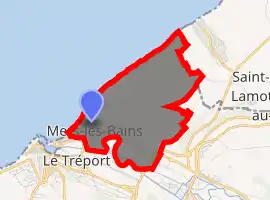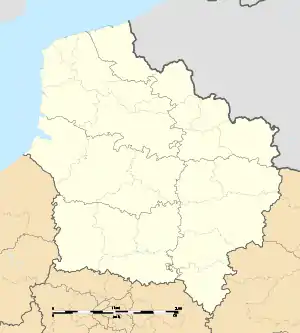Mers-les-Bains
Mers-les-Bains is a commune in the Somme department in Hauts-de-France in northern France.
Mers-les-Bains | |
|---|---|
 A view of the town from Treport | |
 Coat of arms | |
Location of Mers-les-Bains 
| |
 Mers-les-Bains  Mers-les-Bains | |
| Coordinates: 50°04′05″N 1°23′19″E | |
| Country | France |
| Region | Hauts-de-France |
| Department | Somme |
| Arrondissement | Abbeville |
| Canton | Friville-Escarbotin |
| Intercommunality | CC Villes Sœurs |
| Government | |
| • Mayor (2001–2008) | Emmanuel Maquet |
| Area 1 | 5.39 km2 (2.08 sq mi) |
| Population (2017-01-01)[1] | 2,825 |
| • Density | 520/km2 (1,400/sq mi) |
| Time zone | UTC+01:00 (CET) |
| • Summer (DST) | UTC+02:00 (CEST) |
| INSEE/Postal code | 80533 /80350 |
| Elevation | 0–99 m (0–325 ft) (avg. 10 m or 33 ft) |
| 1 French Land Register data, which excludes lakes, ponds, glaciers > 1 km2 (0.386 sq mi or 247 acres) and river estuaries. | |
Geography
.JPG.webp)
The commune is situated on the D1015 road, some 25 miles (40 km) west of Abbeville, Mers-les-Bains faces the English Channel near the mouth of the river Bresle, on the border between Picardy and Normandy. This ‘bathing station’ (seaside resort) has both pebbles and sand (at low tide) on the 1 kilometre (1 mi) beach and high chalk cliffs. With its neighbouring towns Eu and Le Tréport so close by, it appears as one large conglomeration. They are collectively known as the 'three sister-towns' (les trois villes soeurs)."
Much of the older part of town developed in the heyday of seaside bathing, during the latter part of the 19th century. As a consequence, the fine villas that were developed in those times are now subject to preservation orders. Any refurbishment must be in the same materials and colours as the original work. No plastic doors or roller shutters are allowed.
History
Mers-les-Bains’ does not have much history. There are one or two noble families known to have been seigneurs of places within the commune; The coat-of-arms, carved in stone, of the Mython family of Froideville adorns one of the Mayor's offices today. The Lucas family of Rompval, the Lattaignant seigneurs of Blengues, and the Torcy family, seigneurs of Mers-les-Bains are all mentioned in archives. Some parts of their coat-of-arms can still be seen today, as part of the official badge of the town, adopted in December 1962.
Once just a small fishing port, the seaside ‘bathing station’ grew partly because of the railway line that ran from Paris to Tréport. Entire families could make the 3 hour journey from Paris to discover the benefits of bathing and breathe the fresh, iodized air. Many would eventually buy land and build sumptuous second homes in the town.
.JPG.webp)
Population
| Year | Pop. | ±% p.a. |
|---|---|---|
| 1968 | 4,107 | — |
| 1975 | 4,628 | +1.72% |
| 1982 | 3,945 | −2.26% |
| 1990 | 3,540 | −1.34% |
| 1999 | 3,394 | −0.47% |
| 2007 | 3,454 | +0.22% |
| 2012 | 2,880 | −3.57% |
| 2017 | 2,825 | −0.38% |
| Source: INSEE[2] | ||
Places of interest

- A Calvary, in stone, of St. Maximin, adorned by 4 gargoyles.
- Notre-Dame statue on the cliffs.
- The war memorial. A maple leaf commemorates the liberation of the town by the Canadian Chaudière regiment
Personalities
.JPG.webp)
- Eugène Dabit author of the novel (Hôtel du Nord) was born in Mers-les-Bains
- Antoine Vollon, artist, (b. Lyon 1833 – d. Paris 1900) lived here for many years with his son, Alexis (1865–1940)
- Jules Verne spent holidays here with his family.
- Victor Hugo wrote of his summers here.
- Pierre Lefort, doctor and surgeon was born here in 1767.
- Marie-Josèphe Cotelle-Clère sculptor and artist, left many works to the town, as did the artist
- Jules Noël
- Fernand Fabre, actor from the 1920s, retired here.
- Gustave Eiffel, engineer, spent his holidays here.
- François Coppée, writer, worked here
- Augustin Chantrel, footballer who played for France in the World Cup of 1938 was born here.
- Bernard Lavalette, comedian and singer, spends weekends here with his wife in their classically designed villa.
Economy and tourism
The Saint-Gobain glass works, considered a world leader in perfume bottle production, is the town's biggest employer.
The town depends more and more on its reputation as a seaside resort.[3] A prestigious award ‘The pavillon bleu d'Europe’ was awarded in 2006. Holiday residences are newly built or restored each and every year and the town flourishes.
 The sand exposed at low tide
The sand exposed at low tide High tide at Mers
High tide at Mers Sylish balcony
Sylish balcony The beach at sunset
The beach at sunset The beach in summer
The beach in summer Strolling in the evening
Strolling in the evening The statue of Notre-Dame
The statue of Notre-Dame Sumptuous second homes
Sumptuous second homes
Sea defences
Mers-les-Bains has suffered from flooding on a regular basis. The army has been often been deployed with sandbags to stem the flow. A more permanent barrier is now being created for the three towns, at a projected cost of 13 million euros. This involves large rocks, transported on barges from Boulogne, being placed at the feet of the cliffs, to create a buffer and so preserve them and prevent further floods.
Fauna
Both herring gulls and black-headed gulls are found in abundance, along with kestrels, in the air on the lookout for prey. This will include mussels, various crabs, shrimps and prawns.
See also
References
- "Populations légales 2017". INSEE. Retrieved 6 January 2020.
- Population en historique depuis 1968, INSEE
- A tourist office is open every day throughout the year.
External links
| Wikimedia Commons has media related to Mers-les-Bains. |
- Old seaside postcards (in French)
- Official town website (in French)
- Office du tourisme (in French)
- Site du Service départemental d'architecture (SDAP) sur les villas classées de Mers les Bains (in French)
- Information on Le Tréport, Eu and Mers les Bains (in French)